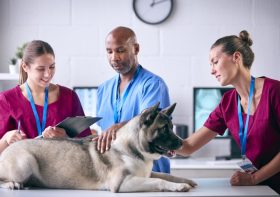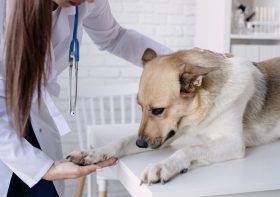What Does a Vet Dentist Do During a Pet Dental Check-Up?

When it comes to maintaining your pet’s health, dental care is just as important as any other aspect. Often overlooked, good dental hygiene can prevent many health issues in your furry friend. A vet dentist plays a crucial role in ensuring that your pet’s teeth and gums are in great shape. You might be curious about what a vet dentist does during a pet dental check-up.
1. Initial Examination
The dental check-up begins with an initial examination. This is when the vet dentist will take a look at your pet’s mouth before doing anything else.
Visual Inspection
-
Teeth and Gums: The vet dentist will visually inspect the teeth and gums to identify any obvious issues.
-
Signs of Damage: They will check for broken or loose teeth, which can indicate dental trauma or disease.
-
Unusual Growths: Any abnormal growths, such as tumors or cysts, will be noted.
-
Gum Health: The color and condition of the gums will be assessed to detect signs of inflammation, infection, or periodontal disease.
Physical Palpation
-
Oral and Jawline Examination: The vet dentist will feel around your pet’s mouth and jawline.
-
Detecting Swelling or Lumps: This palpation helps in identifying any swelling, lumps, or deformities that were not evident during the visual inspection.
-
Assessing Bone Structure: The structure and alignment of the jaw and teeth will be evaluated for any abnormalities.
2. Dental Cleaning
Plaque and Tartar Removal
The vet dentist will start by removing plaque and tartar from the teeth. This is usually done using specialized dental tools designed for pets. Your pet will probably be under anesthesia to ensure it remains still and feels no discomfort during the procedure.
Polishing the Teeth
Once the plaque and tartar are off, the vet dentist will polish your pet’s teeth. This step smoothens the tooth surfaces, making it harder for plaque to stick in the future.
When it comes to specialized care like dental treatments, it’s best to go with a professional. A dog dentist is trained to handle pets’ unique dental needs. They offer services like teeth cleaning, emergency dental care, and even orthodontics in some cases. Regular visits to a dog dentist can keep your pet’s teeth in great shape, reducing the risk of long-term issues.
3. Checking for Dental Diseases
Gum Disease
-
Periodontal Disease: A common issue in pets, periodontal disease can lead to serious health problems if not detected early.
-
Signs of Infection: The vet dentist will examine the gums for redness, swelling, or bleeding, which are indicators of infection.
-
Gum Recession: They will also check for gum recession, where the gums pull away from the teeth, exposing the roots and making them vulnerable to further damage and infection.
Tooth Decay
-
Cavities in Pets: Pets can suffer from cavities similar to humans. During the check-up, the vet dentist will thoroughly examine the teeth for any signs of decay.
-
Identification During Cleaning: Cavities are often identified during the cleaning process when tartar and plaque are removed, revealing any underlying issues.
-
Preventive and Corrective Actions: If decay is found, the vet dentist will take appropriate action, which may include fillings, extractions, or other treatments to prevent further deterioration and pain.
4. Special Procedures
Dental X-Rays
If the vet dentist suspects underlying issues that aren’t visible, dental X-rays might be recommended. These help see below the gum line to identify problems like root infections or bone loss.
Extractions
In cases where a tooth is too damaged to be saved, extraction might be necessary. The vet dentist will perform this procedure carefully to ensure your pet’s comfort.
Another important part of maintaining your pet’s health is regular visits to a diagnostic lab. Regular diagnostic tests can catch health issues early, sometimes even before symptoms appear. For more information, you can visit https://www.fineanimalhospital.com/site/veterinary-lab-bedford. These labs can provide detailed insights into your pet’s health, helping your vet make informed decisions about their care.
5. Preventive Care Tips
Daily Brushing
Once the dental check-up is complete, the vet dentist will likely provide you with some preventive care tips. Brushing your pet’s teeth daily can significantly reduce the buildup of plaque and tartar.
Special Diets and Chews
Special dental diets and chews can also help in keeping your pet’s teeth clean. These are formulated to reduce plaque buildup and improve overall oral health.
Why Dental Health Is Important
Your pet’s dental health can affect their overall well-being. Poor dental hygiene can lead to various issues, including infections that can spread to other parts of the body. Regular check-ups ensure that any potential problems are spotted and treated early, improving your pet’s quality of life.
While dental care is crucial, you should pay attention to other aspects of your pet’s health. For example, dog vaccinations are essential for protecting your pet against various diseases. These vaccinations help build your pet’s immunity, making it less susceptible to illnesses that can compromise its health.
Wrapping Up
Maintaining your pet’s dental health is a multifaceted process that involves more than just home care. Regular check-ups with a vet dentist, good daily habits, and attention to overall health needs like vaccinations and diagnostic tests can keep your pet happy and healthy. If you have any concerns about your pet’s oral health, don’t hesitate to consult with a vet dentist for expert advice and treatments.


